Restoration Of Ties With Saudi Boosts Iran's Currency
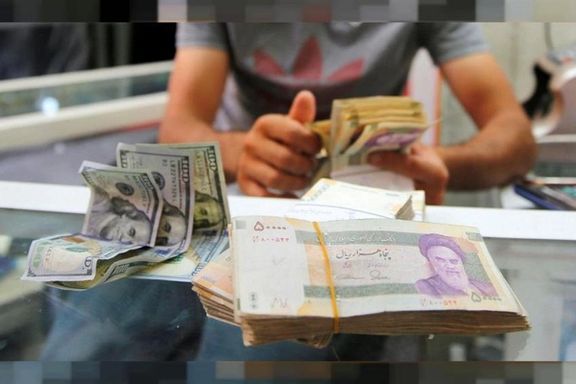
Iran’s battered currency, rial, rose more than 10 percent on Saturday following an agreement announced Friday to restore diplomatic relations with Saudi Arabia.

Iran’s battered currency, rial, rose more than 10 percent on Saturday following an agreement announced Friday to restore diplomatic relations with Saudi Arabia.
The rial has risen 25 percent since February 26 when it dropped to a historic low of 600,000 to the US dollar. A visit by the head of the UN nuclear watchdog, the IAEA, to Tehran on March 4 helped the rial rally, seen as a possible opening to resolve the country’s nuclear dispute with the United States.
The restoration of ties with Saudi Arabia provided another significant boost.
The rial traded at around 450,000 to the dollar Saturday, as the representative of currency exchange dealers in Tehran claimed that demand for dollars “has dropped to zero.”
Iran’s currency began losing value when for US President Donald Trump decided to withdraw from the Obama-era nuclear deal, the JCPOA, in 2018. By August 2022, the rial stood at 300,000 to the dollar, a nine-fold drop since Trump’s decision.
After Biden administration nuclear talks with Tehran reached a deadlock in September, the rial began to fall again reaching its lowest point in late February.
Hope about a possible foreign policy shift to help end Iran’s isolation immediately impacts rial’s value. An agreement with the United States would lift crippling economic sanctions, allowing Iran to export more oil at higher prices and gain hard currency revenues it needs for imports.

Kaspersky security firm says that among the countries of the Middle East and Africa, Iran is at the top of the list of countries affected by digital stalking.
Stalkerware is a commercially available software that can be installed on smartphone devices, enabling perpetrators to monitor an individual’s private life without their knowledge.
According to the company's annual report, a total of 1,754 people has been victim of stalking in Iran in 2022. It also adds that the total number of victims of digital stalking in the world in 2022 was 29,312; a number that shows a relative decrease compared to the year before.
The data covers the affected number of Kaspersky users, with the total global number of affected individuals likely to be much higher.
The "Coalition Against Stalkerware" organization estimates the number of victims of these spyware programs to be around one million every year.
Stalkerware can be downloaded and easily installed by anyone with an Internet connection. A perpetrator can use the software to monitor huge volumes of personal data and check device location, text messages, social media chats, photos, browser history and more.
Russia has the highest number of victims of spyware in the world with 8,281 cases, followed by Brazil with 4,969 and India with 1,807 victims.
In this way, Iran is the fourth country with the most victims of spyware in the world.
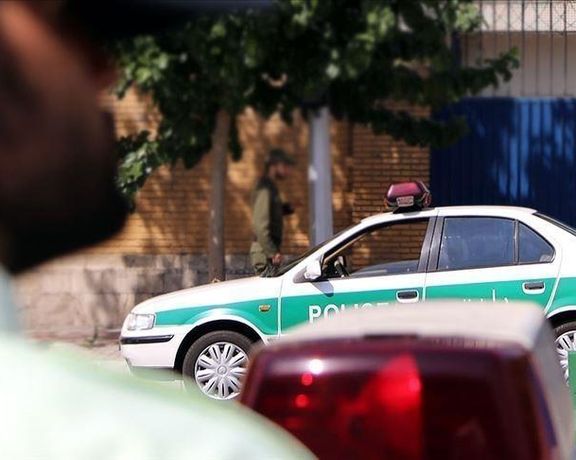
Reports from Iran say two police officers have been gunned down in Iran's protest-hit southeastern province of Sistan and Baluchestan.
The attack occurred in a region called Golshan on Friday. However, no information has been published about the identity of the assailants, their possible arrest or their motives.
Local media identified the two officers as Mohsen Pudinei and Ehsan Shahraki who were shot "while carrying out a security mission regarding Friday prayers".
The government has been trying to contain protests in the province on Fridays following weekly prayers.
State news agencies say the attack was carried out by “armed thugs”. The term is a vague description that officials use to refer to armed people affiliated with political groups opposed to the regime and sometimes drug traffickers.
After the "Bloody Friday" of Zahedan, the cities of Sistan and Baluchistan have been the scene of massive street protests every Friday after prayers.
The Bloody Friday in Zahedan, the provincial capital of Sistan-Baluchestan took place September 30, when security forces killed at least 93 people, and injured hundreds more during antigovernment protests.
No one has been arrested and prosecuted for shooting protesters in the province.
In recent months, pressure on the people of Sistan-Baluchistan has increased, and the situation in various cities has been described as very tense, especially on Fridays.
Amid tensions, the commander of the police force of this province was changed on February 27 for the second time since the beginning of the protests following the death of Mahsa Amini in police custody.

Israel was not taken by surprise when Iran and Saudi Arabia agreed to revive ties, a senior Israeli official told Iran International, amid criticism by the opposition.
The official who requested anonymity was accompanying Prime Minister Benjamin Netanyahu during his trip to Italy on Saturday. He insisted that the Israeli government knew about the talks between Tehran and Riyadh “for a long time” and was following the process.
The official said that Saudi Arabia’s decision to re-establish diplomatic ties with Iran, severed since 2016, will not have an impact on the chances of Israeli-Saudi relations.
The Netanyahu government and President Joe Biden’s administration have been trying to expand the 2020 Abraham Accords to include Saudi Arabia, which has been holding out, making demands both on Israel and the United States.
However, since the news of the Iranian-Saudi deal broke on Friday, many commentators have seen the development as a win for China that brokered the agreement.
The Wall Street Journal in an editorial blamed Biden and the Democrats for annoying the Saudis and pushing them into China’s arms. The Journal said, “the symbolic import is hard to miss as Democrats in Washington do everything they can to harass and annoy the Saudis,” adding that getting a cold shoulder from Washington Riyadh decided to “hedge” its bets.
The Israeli official also said that in case of a decision to attack Iran’s nuclear facilities, Israel “is neither dependent on anyone, nor waiting for anyone’s permission.” However, he added that Israel will be happy with US political and military support and backing from European countries.
Former Israeli Prime Minister Naftali Bennett has described the resumption of ties between Tehran and Riyadh as harmful to chances of bringing Saudi Arabia into the Abraham Accords, saying that it is a serious defeat for Netanyahu.
Netanyahu faces serious opposition at home for his domestic policies and his critics charge that because of his entanglements at home, he missed the Saudi-Iranian rapprochement.
The senior official agreed that Israel’s internal crisis impacts its confrontation with the Islamic Republic and for this reason the political row should be ended as soon as possible.
Some Israeli media argued that the resumption of diplomatic relation will not dampen Saudi Arabia’s opposition to the Shiite regime in Iran and Riyadh remain open to joining the Abraham accords.
The Wall Street Journal and the New York Times reported this week that Saudi Arabia is demanding concessions from the Biden administration to join the peace accords with Israel. It wants US assistance in developing a nuclear power industry and less restrictions on arms sales to the kingdom. Many see the Chinese-brokered deal with Iran as further pressure by Riyadh on both the United States and Israel.
Some Israeli media have also reported that Saudis want Israel’s help in securing their demands from Washington.
Saudis have long said that formal diplomatic relations with Israel depend on a peaceful resolution to the Israel-Palestine conflict, though the two have been conducting business and security cooperation behind closed doors for some time. Saudi also opened its air space to Israel, in the wake of the Accords, signed in 2020.
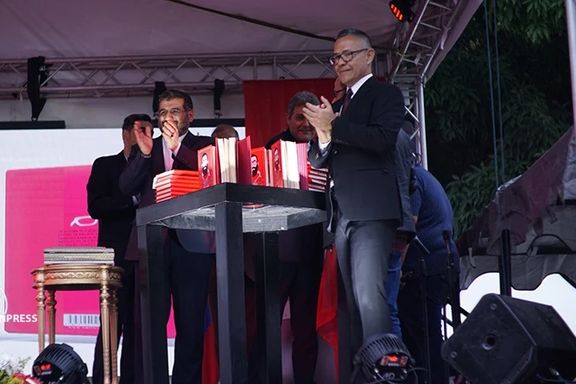
In order to expand the Islamic Republic’s influence in Latin America, a Spanish translation of a book by Iranian Supreme Leader has been unveiled in Venezuela.
The book titled "Cell No. 14” is memoirs Iran's authoritarian ruler Ali Khamenei that was unveiled on the sidelines of the Iran-Venezuela culture and friendship exhibition in Caracas on Friday.
The book covers the first half of Khamenei's life when he was a religious opponent of the secular monarchy, from his early years until the 1979 revolution. It also contains illustrations portraying different periods of his life.
In a message on the occasion, Khamenei told Venezuelans that “It is good that you and all justice-seeking nations get to know each other more and cooperate more.”
Iran has been running overt and covert operations to build influence and networks in Latin America, together with its proxies, such as the Lebanese Hezbollah.
Tehran has made plenty of economic promises to the region’s countries, but few have materialized because the period since has been marked by crippling international and US sanctions on Tehran.
Secret Iranian and Hezbollah networks are involved in illicit activities, allegedly including the drug trade for generating funds.
Iran also converts locals to Shiite Islam and sends some to its seminaries in the religious city of Qom to be trained and indoctrinated.
The presence of the Islamic Republic in Latin America has been a growing concern for the US in recent years with several Congressional reports presented in different Senate and House committees detailing Iran’s influence in the region.
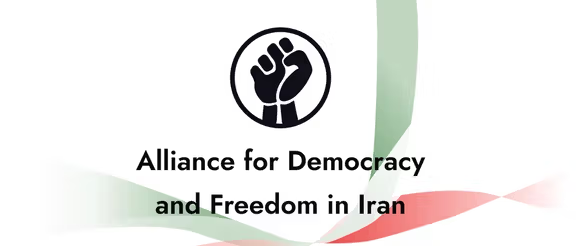
Prominent Iranian dissident figures, who have recently made an alliance against the Islamic Republic, has issued a Charter of Solidarity and Alliance for Freedom.
The group, which calls itself the Alliance for Democracy and Freedom in Iran, announced its existence in a February event at Georgetown University's Institute for Women, Peace and Security (GIWPS) -- titled ‘The Future of Iran’s Democracy Movement.'
Exiled Prince Reza Pahlavi, Nobel peace prize laureate Shirin Ebadi and Canada-based activist Hamed Esmaeilion, as well as US-based author, journalist and women’s rights activist Masih Alinejad, actress and activist Nazanin Boniadi and Secretary General of Komala Iranian Kurdish party Abdullah Mohtadi had said that they would release the charter that would lay the foundations for political representation of the aspirations of protesters in Iran and gain support for isolating the Islamic Republic.
The document is also called the Mahsa Charter in reference to “the murder of Mahsa (Jina) Amini and the beginning of the Woman, Life, Freedom revolution,” which has seen the people of Iran continuing to fight for freedom “to break the chains of injustice, discrimination and tyranny.”
Emphasizing that the way to building a free and democratic Iran is to overcome the Islamic Republic regime, they said, “Reaching this ultimate goal necessitates the three elements of unison, organization and relentless continuity in activism.”
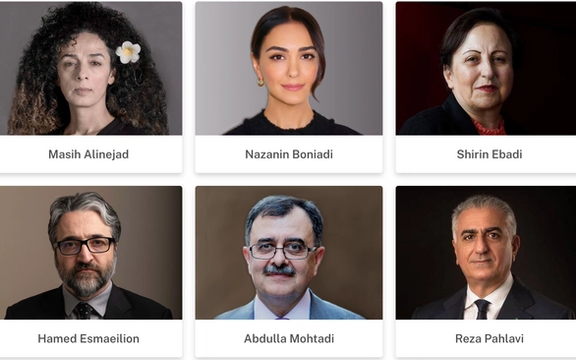
They said the charter relies initially on activities outside of the country, underlining that the isolation of the Islamic government internationally is a first and necessary step for a democratic change.
The charter calls for international pressure on the Islamic Republic to halt all death sentences and to immediately release all political prisoners without condition; expulsion of the regime’s ambassadors and all its dependents by democratic governments and acknowledging the alliance of opposition figures as well as their charter; and facilitating any means necessary to aid the people of Iran.
“Subsequent actions will take place with the participation of activists inside Iran to focus on fair transitional justice, the formation of a council for the transition of power, and the means by which power is transferred to a secular, democratic government,” reads the charter, adding that “The Alliance will introduce actionable initiatives using democratic methods to be implemented at the earliest opportunity in order to bring to fruition the civil action struggles of the people of Iran.”
The members of the alliance have repeatedly said that anyone who accepts the core values of the group is welcome to join them, but until now there had not been a clear explanation for their main values. They enumerated 17 common values for a democratic Iran, noting that the form of the future government will be a secular-democratic system determined through a referendum. “All political and official members of the state shall be elected through a free and democratic election process whereby citizens of all beliefs, ethnicities, gender and sexual orientation be afforded dignity and equal rights before the law.”
The need to maintain the territorial integrity of Iran while accepting diversity in language, ethnicity, religion and culture; and to decentralize power by deferring financial, bureaucratic and policy making affairs to elected provincial, city, and regional administrations is also among the values.
The charter also talks about the formation of an independent organization to supervise elections and the acceptance of domestic and international monitoring of elections, which would result in “a new national constitution through an inclusive and transparent process.” “The new constitution shall adhere to the Universal Declaration of Human Rights in its entirety.”
The charter also mentions the abolition of the death penalty and any corporal punishment and enacting the Convention on the Elimination of All Forms of Discrimination against Women as well as the establishment of an independent judicial system in accordance with international standards. It calls for Justice for all victims of the Islamic Republic through fact finding commissions under the auspices of fair and independent courts including the right to independent legal representation.
One of main points of the charter is the abolition of the Islamic Revolutionary Guards Corp – or the IRGC -- and all of its subsidiaries. “The possibility to integrate IRGC elements into other armed forces such as the army may only be possible in the absence of involvement in crimes and based on necessary qualifications,” it said, adding that “The military shall only be responsible to defend the territorial integrity of the country.”
It also called for “cooperation and peaceful relations with all countries in the world, and to cease all interference in the affairs of other countries, and to join the International Criminal Court.” Joining the International Convention on Nuclear Safety and the Financial Action Task Force (FATF) were key values in the charter.
“To overcome the Islamic Republic’s tyranny, all Iranians who are committed to freedom must unite. The courage of the people of Iran and their persistent fight for freedom shall be the bright beacon of hope for our future. Let us stand united in the creation of a free tomorrow," the charter concluded.